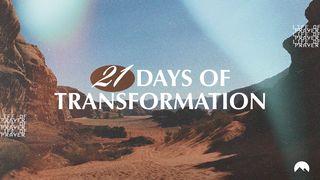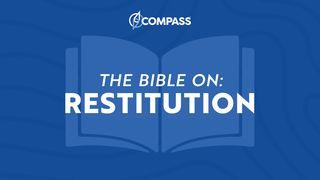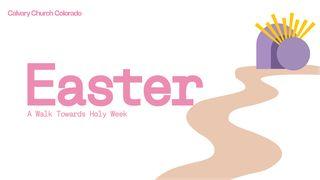Lent For EveryoneSample

EASTER THURSDAY
Now, in Easter week, try reading the whole Sermon on the Mount as a blueprint for how Jesus' Easter-people should live. Now at last, with Jesus leading the way through death to new life, we see what it might mean to be poor in spirit, to be meek, peacemakers, and so on. Now, already, the mourners are being comforted, the pure in heart glimpsing the living God in Jesus himself. Now at last, as well, those who follow Jesus will be persecuted because of their love for him and the new world of justice and joy which he has opened up, which challenges the old world to its core. Now, at last, we can see the sense in the demanding new way of life which he has launched.
That is the spirit in which, for instance, we should read the bracing commands of 5.21—48. This is what it might mean to be genuinely human! The Easter message declares that it is possible to live without anger, without lust, without divorce, swearing, revenge and hatred. Most of the world doesn't know this, but Jesus knew it; and at Easter he calls us to die to all those things, and come alive to his new way of life. Yes, it will be tough. Yes, dying in any sense is hard and unpleasant. So many theories about human behaviour have assumed that we ought to feel as comfortable as possible as much as possible. Then we wonder why life goes downhill, rather than attaining the heights we glimpse from time to time. Easter is where we not only see those heights but start to scale them.
Then, as the Sermon reaches a kind of climax, we have this passage about worry — or rather, about not worrying. Modern life, of course, thrives on worry. We only have to think back a century or two before radio, television, regular swift mail around the country and the world, and so on, to realize that for most people most of the time the world beyond their immediate village was a closed book. Worry was localized — none the easier for that, but think what we have done. We have made a global issue of it: we worry about nuclear power in the Middle East, about bush fires in Australia, about ecological disasters in Alaska. And, of course, this doesn't remove the local and personal worries about meeting the bills, about feeding the family, about the uncertainty of life itself.
And Jesus tells us — the Easter Jesus tells us — not to worry about any of them. He could give that instruction already, during his ministry; how much more can he give it now that he is raised from the dead, now that he has overthrown the greatest worry of all, death itself? One of the chief notes in the life of the early Christians was joy: joy because a new way of life had been launched, new creation had begun, and it was clear that God had commenced his reign and could be trusted to bring it to completion. 'Seek first the kingdom of God, and his righteousness,' said Jesus, 'and all these things will be given to you as well.' And Easter reaffirms, gloriously, the way in which Jesus drew his examples from the natural order. The birds don't plant seed and reap harvests, but they get enough to eat. The lilies don't work at weaving, yet they are dressed magnificently. Other philosophies might scoff at such examples: they come from this world of space, time and matter, not the eternal world of ideas. But Easter reminds us emphatically that the world of space, time and matter is redeemed, not abandoned. In raising Jesus, God has reaffirmed the goodness of the natural world, and his compassionate care for it. In that care we can rest secure.
Worry and Easter, then, don't go together. Someone once asked that great teacher and saint, Bishop Lesslie Newbigin, whether he was an optimist or a pessimist. 'I am neither an optimist', he said, 'nor a pessimist. Jesus Christ is risen from the dead!' He had learned the Easter lesson which brings the Sermon on the Mount to life. Our life.
TODAY
Help us, gracious Lord, to live our whole life in full and joyful trust in the power of your resurrection.
Now, in Easter week, try reading the whole Sermon on the Mount as a blueprint for how Jesus' Easter-people should live. Now at last, with Jesus leading the way through death to new life, we see what it might mean to be poor in spirit, to be meek, peacemakers, and so on. Now, already, the mourners are being comforted, the pure in heart glimpsing the living God in Jesus himself. Now at last, as well, those who follow Jesus will be persecuted because of their love for him and the new world of justice and joy which he has opened up, which challenges the old world to its core. Now, at last, we can see the sense in the demanding new way of life which he has launched.
That is the spirit in which, for instance, we should read the bracing commands of 5.21—48. This is what it might mean to be genuinely human! The Easter message declares that it is possible to live without anger, without lust, without divorce, swearing, revenge and hatred. Most of the world doesn't know this, but Jesus knew it; and at Easter he calls us to die to all those things, and come alive to his new way of life. Yes, it will be tough. Yes, dying in any sense is hard and unpleasant. So many theories about human behaviour have assumed that we ought to feel as comfortable as possible as much as possible. Then we wonder why life goes downhill, rather than attaining the heights we glimpse from time to time. Easter is where we not only see those heights but start to scale them.
Then, as the Sermon reaches a kind of climax, we have this passage about worry — or rather, about not worrying. Modern life, of course, thrives on worry. We only have to think back a century or two before radio, television, regular swift mail around the country and the world, and so on, to realize that for most people most of the time the world beyond their immediate village was a closed book. Worry was localized — none the easier for that, but think what we have done. We have made a global issue of it: we worry about nuclear power in the Middle East, about bush fires in Australia, about ecological disasters in Alaska. And, of course, this doesn't remove the local and personal worries about meeting the bills, about feeding the family, about the uncertainty of life itself.
And Jesus tells us — the Easter Jesus tells us — not to worry about any of them. He could give that instruction already, during his ministry; how much more can he give it now that he is raised from the dead, now that he has overthrown the greatest worry of all, death itself? One of the chief notes in the life of the early Christians was joy: joy because a new way of life had been launched, new creation had begun, and it was clear that God had commenced his reign and could be trusted to bring it to completion. 'Seek first the kingdom of God, and his righteousness,' said Jesus, 'and all these things will be given to you as well.' And Easter reaffirms, gloriously, the way in which Jesus drew his examples from the natural order. The birds don't plant seed and reap harvests, but they get enough to eat. The lilies don't work at weaving, yet they are dressed magnificently. Other philosophies might scoff at such examples: they come from this world of space, time and matter, not the eternal world of ideas. But Easter reminds us emphatically that the world of space, time and matter is redeemed, not abandoned. In raising Jesus, God has reaffirmed the goodness of the natural world, and his compassionate care for it. In that care we can rest secure.
Worry and Easter, then, don't go together. Someone once asked that great teacher and saint, Bishop Lesslie Newbigin, whether he was an optimist or a pessimist. 'I am neither an optimist', he said, 'nor a pessimist. Jesus Christ is risen from the dead!' He had learned the Easter lesson which brings the Sermon on the Mount to life. Our life.
TODAY
Help us, gracious Lord, to live our whole life in full and joyful trust in the power of your resurrection.
Scripture
About this Plan

Lent for Everyone is a devotional created and written by N.T. (Tom) Wright. For each day of Lent, there is a reading chosen from the Gospel of Matthew, plus a reflection by Wright. These readings have grown out of a project encouraging Lent reading in Northern England. This is the second in a three-volume series based on the Revised Common Lectionary of the Church of England.
More
We would like to thank SPCK Publishing for providing Lent for Everyone by Tom Wright. For more information, please visit their site: http://www.spckpublishing.co.uk/shop/lent-for-everyone-matthew/
Related Plans

21 Days of Transformation

Blessed: Unlocking the Power of the Beatitudes

After the Cross

God as Your Planmaker - Jeremiah 29:11

The Shift: Part 3

Financial Discipleship – the Bible on Restitution

Hearing God's Voice

Risen With Christ: Embracing New Life With Jesus

Encounters With People
